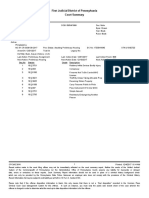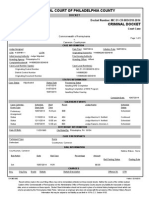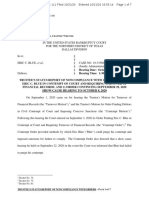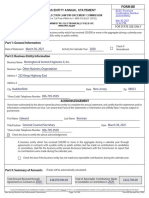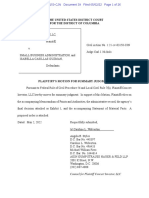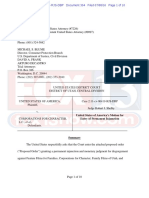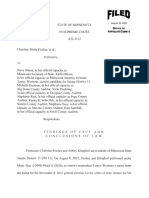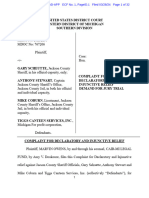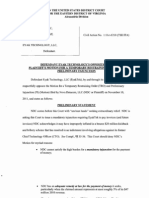May 2021 Indiana Appellate Court Re Alfa Subpoena
May 2021 Indiana Appellate Court Re Alfa Subpoena
Uploaded by
File 411Copyright:
Available Formats
May 2021 Indiana Appellate Court Re Alfa Subpoena
May 2021 Indiana Appellate Court Re Alfa Subpoena
Uploaded by
File 411Copyright
Available Formats
Share this document
Did you find this document useful?
Is this content inappropriate?
Copyright:
Available Formats
May 2021 Indiana Appellate Court Re Alfa Subpoena
May 2021 Indiana Appellate Court Re Alfa Subpoena
Uploaded by
File 411Copyright:
Available Formats
FILED
May 19 2021, 9:55 am
CLERK
Indiana Supreme Court
Court of Appeals
and Tax Court
ATTORNEYS FOR APPELLANT ATTORNEYS FOR NON-PARTY
James P. Buchholz APPELLEE
Tourkow, Crell, Rosenblatt & Johnston L. JEAN CAMP:
Fort Wayne, Indiana Ann O’Connor McCready
Margaret E. Krawiec Vivek R. Hadley
Michael A. McIntosh Donald E. Morgan
Skadden, Arps, Slate, Meagher & Flom, Taft Stettinius & Hollister LLP
LLP Indianapolis, Indiana
Washington, DC Mark A. Lemley
Aditya V. Kamdar
Durie Tangri LLP
San Francisco, California
ATTORNEYS FOR FRIEND OF
THE COURT
ELECTRONIC FRONTIER
FOUNDATION:
D. Michael Allen
Colleen M. Newbill
Joseph A. Tomain
Mallor Grodner LLP
Bloomington, Indiana
IN THE
COURT OF APPEALS OF INDIANA
Court of Appeals of Indiana | Opinion 20A-MI-2352 | May 19, 2021 Page 1 of 11
AO Alfa-Bank, May 19, 2021
Appellant-Plaintiff, Court of Appeals Case No.
20A-MI-2352
v. Appeal from the Monroe Circuit
Court
John Doe, et al. The Honorable Frank M. Nardi,
Appellees-Defendants, Special Judge
Trial Court Cause No.
and
53C04-2009-MI-1613
L. Jean Camp,
Non-Party Appellee.
Tavitas, Judge.
Case Summary
[1] AO Alfa-Bank (“Bank”) appeals the trial court’s grant of a motion to quash a
subpoena duces tecum issued to a non-party, L. Jean Camp (“Camp”), by a
Florida trial court. Without following the procedures outlined in the Uniform
Interstate Depositions and Discovery Act, see Indiana Code Chapter 34-44.5-1
(“the Act”), the Bank issued a Florida non-party subpoena duces tecum to
Camp related to litigation filed in a Florida trial court (“Florida Subpoena”).
Camp filed a motion to quash the Florida Subpoena in the Monroe Circuit
Court. The Monroe Circuit Court considered the merits of the issue and
granted Camp’s motion. The Bank appeals, arguing that the trial court erred by
granting the motion to quash. We conclude, however, that the trial court
lacked subject matter jurisdiction to address the motion to quash. Accordingly,
we vacate the trial court’s order and dismiss this appeal.
Court of Appeals of Indiana | Opinion 20A-MI-2352 | May 19, 2021 Page 2 of 11
Issues
[2] The Bank raises two issues 1, but we sua sponte address one dispositive issue,
which we restate as whether the Indiana trial court had subject matter
jurisdiction to consider the motion to quash the Florida Subpoena.
Facts
[3] The Bank is “one of Russia’s largest privately owned commercial banks.”
Appellant’s App. Vol. II p. 33. Camp is a security researcher and professor at
Indiana University, Bloomington Campus, where she is the director of the
Center for Security and Privacy in Informatics, Computing, and Engineering.
[4] In response to June 2016 reports that Russian hackers infiltrated the
Democratic National Committee’s servers, a group of anonymous researchers
(“Anonymous Researchers”) “worked together to uncover evidence of other
network intrusions related to the upcoming U.S. Presidential election.” Id. at
48. The Anonymous Researchers discovered that Domain Name System
(“DNS”) 2 records showed repeated interactions between the Trump
Organization and the Bank. Camp spoke with media organizations about the
DNS data and posted the DNS logs to her website.
1
The Bank argues that: (1) the trial court erred by granting the motion to quash because Camp did not have
standing to assert the rights of absent third parties; and (2) the trial court erred by granting the motion to
quash because the subpoena was overly broad, unreasonable, and unduly burdensome.
2
According to Camp, “DNS records show the history of computer communications between servers on the
Internet.” Appellee’s Br. p. 11 n.1.
Court of Appeals of Indiana | Opinion 20A-MI-2352 | May 19, 2021 Page 3 of 11
[5] In June 2020, the Bank filed a complaint in a Florida trial court against John
Doe Defendants. The Bank alleges that the John Doe Defendants conspired to
commit cyberattacks against the Bank in 2016 and 2017 in order to create DNS
records that would “create the illusion of secret communications” between the
Bank and the Trump Organization. Id. at 35. The Bank does not allege that
Camp or the Anonymous Researchers participated in these alleged
cyberattacks. The complaint theorized that the John Doe Defendants
“pointed” the Anonymous Researchers “in the direction of the planted [DNS]
evidence.” Id. at 50.
[6] In June 2020, the Bank unsuccessfully attempted service of the Florida
Subpoena, which was issued by a Florida trial court under a Florida cause
number, to Camp in Indiana through the Monroe County Sheriff’s
Department. 3 The Bank then emailed the Florida Subpoena to Camp’s attorney
and asked if the attorney “would be willing to accept service of the subpoena.”
Id. at 187. Camp’s attorney agreed to accept service on Camp’s behalf “in
exchange for an extension of time to respond to the subpoena.” Id. at 227. The
Bank then agreed to an extension of time to respond to the Florida Subpoena
until September 7, 2020, which was a holiday. There is no indication in the
record provided to us that the Bank submitted the Florida Subpoena to the
3
The return of service noted that Camp was “[n]ot expected to return to I.U. Bloomington until Aug/Sept
2020.” Appellant’s App. Vol. II p. 66.
Court of Appeals of Indiana | Opinion 20A-MI-2352 | May 19, 2021 Page 4 of 11
Monroe County Clerk or that the Monroe County Clerk issued an Indiana
subpoena for service.
[7] On September 8, 2020, in the Monroe Circuit Court, Camp filed a motion to
quash the Florida Subpoena. 4 The Bank filed an objection to Camp’s motion to
quash, and after a hearing, the trial court entered an order on the merits
granting Camp’s motion to quash the Florida Subpoena. Neither the parties
nor the trial court substantively addressed the Uniform Interstate Depositions
and Discovery Act, see Indiana Code Chapter 34-44.5-1, or raised the Bank’s
failure to comply with the Act. Regarding the Act, the trial court’s order merely
provides:
1. On or about June l7, 2020, the plaintiff issued a Subpoena
Duces Tecum Without Deposition to L. Jean Camp, School of
Informatics & Computing, Office #300, 901 E. 10th St., Indiana
University, Bloomington, IN 47405 in cause number 50-2020-
CA-006304-XXX-MB in the Circuit Court of the Fifteenth
Judicial Circuit In and For Palm Beach, Florida, Circuit Civil
Division, which cause is entitled AO Alfa-Bank, Plaintiff, vs.
John Doe, et al, Defendants. L. Jean Camp is not a party to the
described cause of action.
2. Under the Uniform Interstate Depositions And Discovery Act,
I.C. 34-44.5-1-1 et seq. compliance with this subpoena shall be
determined by Indiana law.
4
Amicus curiae Electronic Frontier Foundation, Inc., (“EFF”) filed a brief in support of Camp with the trial
court and in this appeal. EFF describes itself as “a member-supported, nonprofit organization that works to
protect civil liberties and human rights in the digital world.” Appellant’s App. Vol. II p. 81.
Court of Appeals of Indiana | Opinion 20A-MI-2352 | May 19, 2021 Page 5 of 11
Appellant’s App. Vol. II p. 9. The Bank now appeals. 5
Analysis
[8] The Bank appeals the trial court’s grant of Camp’s motion to quash the Florida
Subpoena. We sua sponte, however, consider whether the trial court had
subject matter jurisdiction to address the Florida Subpoena and the motion to
quash. Our Supreme Court has clarified that subject matter jurisdiction
involves a “determination of whether a court has jurisdiction over the general
class of actions to which a particular case belongs.” K.S. v. State, 849 N.E.2d
538, 542 (Ind. 2006). “[I]n determining whether a court has subject-matter
jurisdiction, the only relevant inquiry is whether the petitioner’s claim ‘falls
within the general scope of the authority conferred upon such court by the
constitution or by statute.’” State v. Reinhart, 112 N.E.3d 705, 711-12 (Ind.
2018) (quoting State ex rel. Young v. Noble Cir. Ct., 263 Ind. 353, 356, 332 N.E.2d
99, 101 (1975)); Blanck v. Ind. Dep’t of Corr., 829 N.E.2d 505, 508 (Ind. 2005)
(“Resolution of the subject matter jurisdiction issue involves determining
whether the claim advanced falls within the general scope of authority
conferred upon the court by constitution or statute.”).
[9] “‘If a court does not have subject matter jurisdiction, any judgment it renders is
void.’” Vic’s Antiques & Uniques, Inc. v. J. Elra Holdingz, LLC, 143 N.E.3d 300,
5
There was disagreement regarding whether the trial court’s November 20, 2020 order was an interlocutory
order or a final judgment. On February 12, 2021, this Court held that the trial court’s order is a final
judgment under Indiana Appellate Rule 2(H).
Court of Appeals of Indiana | Opinion 20A-MI-2352 | May 19, 2021 Page 6 of 11
308-09 (Ind. Ct. App. 2020) (quoting Hoang v. Jamestown Homes, Inc., 768
N.E.2d 1029, 1032 (Ind. Ct. App. 2002), trans. denied), trans. denied. “Because
void judgments may be attacked directly or collaterally at any time, the issue of
subject matter jurisdiction cannot be waived and may be raised at any point by
a party or by the court sua sponte.” Id.; see also Whiting v. State, 969 N.E.2d 24,
32 n.8 (Ind. 2012) (holding that the lack of subject-matter jurisdiction “can be
raised at any point during the proceeding and by the court sua sponte”).
“Because the authority granted by a statute is a question of law, we review the
question of subject matter jurisdiction de novo.” Id.
[10] Foreign subpoenas 6 are governed by the Uniform Interstate Depositions and
Discovery Act, see Indiana Code Chapter 34-44.5-1. Indiana Code Section 34-
44.5-1-6 provides:
(a) To request issuance of a subpoena under this chapter that is
based on a foreign subpoena, a party must submit the foreign
subpoena to the clerk of the court in the county in which discovery is
sought to be conducted in Indiana. A request for the issuance of a
6
The Act defines “foreign subpoena” as “a subpoena issued under authority of a court of record of a foreign
jurisdiction.” Ind. Code § 34-44.5-1-2. A “foreign jurisdiction” is “a state other than Indiana.” I.C. § 34-
44.5-1-1. Further, a “state” is defined as:
(1) A state of the United States.
(2) The District of Columbia.
(3) Puerto Rico.
(4) The United States Virgin Islands.
(5) A federally recognized Indian tribe.
(6) Any territory or insular possession subject to the jurisdiction of the United States.
I.C. § 34-44.5-1-4.
Court of Appeals of Indiana | Opinion 20A-MI-2352 | May 19, 2021 Page 7 of 11
subpoena under this chapter does not constitute an appearance in
a court of this state.
(b) When a party submits a foreign subpoena to the clerk of a court in
Indiana, the clerk, in accordance with the court’s procedure, shall
promptly issue a subpoena for service upon the person to which the
foreign subpoena is directed.
(c) A subpoena issued under subsection (b) must:
(1) incorporate the terms used in the foreign subpoena; and
(2) contain or be accompanied by the names, addresses,
and telephone numbers of the following:
(A) All counsel of record in the proceeding to which
the subpoena relates.
(B) Any party not represented by counsel.
(emphasis added). Further, Indiana Code Section 34-44.5-1-7 provides: “A
subpoena issued by a clerk of the court under section 6 of this chapter must be
served in compliance with all applicable laws concerning service of a subpoena
in Indiana.”
[11] The Comments to the Uniform Interstate Depositions and Discovery Act
(“Uniform Act”) provide:
Presenting a subpoena to the clerk of court in the discovery state,
so that a subpoena is then issued in the name of the discovery
state, is the necessary act that invokes the jurisdiction of the discovery
Court of Appeals of Indiana | Opinion 20A-MI-2352 | May 19, 2021 Page 8 of 11
state, which in turn makes the newly issued subpoena both
enforceable and challengeable in the discovery state.
*****
The act of the clerk of court is ministerial, yet is sufficient to invoke
the jurisdiction of the discovery state over the deponent.
Comment to UNIF. INTERSTATE DEPOSITIONS AND DISCOVERY ACT § 3,
Issuance of Subpoena. 7
[12] Our Supreme Court has held “[t]he comments to a uniform act are indicative of
the Legislature’s intent in enacting a statute based on the uniform act.” Basileh
v. Alghusain, 912 N.E.2d 814, 821 (Ind. 2009). Given that the Uniform Act is
substantially similar to Indiana Code Chapter 34-44.5-1, “we consider the
7
The Comments to the Uniform Act also describe the standard procedure as follows:
The committee envisions the standard procedure under this section will become as follows,
using as an example a case filed in Kansas (the trial state) where the witness to be deposed lives
in Florida (the discovery state): A lawyer of record for a party in the action pending in Kansas
will issue a subpoena in Kansas (the same way lawyers in Kansas routinely issue subpoenas in
pending actions). That lawyer will then check with the clerk’s office, in the Florida county or
district in which the witness to be deposed lives, to obtain a copy of its subpoena form (the
clerk’s office will usually have a Web page explaining its forms and procedures). The lawyer
will then prepare a Florida subpoena so that it has the same terms as the Kansas subpoena. The
lawyer will then hire a process server (or local counsel) in Florida, who will take the completed
and executed Kansas subpoena and the completed but not yet executed Florida subpoena to the
clerk's office in Florida. In addition, the lawyer might prepare a short transmittal letter to
accompany the Kansas subpoena, advising the clerk that the Florida subpoena is being sought
pursuant to Florida statute ___ (citing the appropriate statute or rule and quoting Sec. 3). The
clerk of court, upon being given the Kansas subpoena, will then issue the identical Florida
subpoena (“issue” includes signing, stamping, and assigning a case or docket number). The
process server (or other agent of the party) will pay any necessary filing fees, and then serve the
Florida subpoena on the deponent in accordance with Florida law (which includes any
applicable local rules).
Comment to UNIF. INTERSTATE DEPOSITIONS AND DISCOVERY ACT § 3, Issuance of Subpoena.
Court of Appeals of Indiana | Opinion 20A-MI-2352 | May 19, 2021 Page 9 of 11
language of the Comment to be a strong indicator of the legislative intent
underlying the statute.” State ex rel. Hill v. Lawson, 128 N.E.3d 471, 475 (Ind.
Ct. App. 2019).
[13] We are faced with the initial issue of whether the claim advanced—the motion
to quash the foreign subpoena—falls within the general scope of authority
conferred upon the court by the constitution or a statute. See Blanck, 829
N.E.2d at 508. There is no indication that the claim falls within the general
scope of authority conferred upon the Monroe Circuit Court by the
constitution, and likewise, there is no statutory authority giving the Monroe
Circuit Court authority to consider a motion to quash a foreign subpoena.
[14] The record provided to us is devoid of any indication that the Bank submitted
the Florida Subpoena to the Monroe County Clerk for the issuance of an
Indiana subpoena, which is the necessary act to invoke the jurisdiction of the
Indiana courts. Indiana courts are not granted general, unqualified jurisdiction
and authority to enforce or quash foreign subpoenas. Rather, Indiana courts
are granted the authority to address foreign subpoenas only where the foreign
subpoena has been domesticated pursuant to Indiana Code Chapter 34-44.5-1.
An Indiana trial court has no authority to enforce a subpoena issued by The
Circuit Court of the Fifteenth Judicial Circuit in and for Palm Beach County,
Florida, unless properly domesticated as provided under the Act.
[15] The lack of domestication is a jurisdictional threshold, not a procedural error
that can be avoided by waiver or consent of the parties. The parties obviously
Court of Appeals of Indiana | Opinion 20A-MI-2352 | May 19, 2021 Page 10 of 11
waived and/or consented to the trial court’s consideration of the motion to
quash without following the requisite procedure. While we recognize that
parties may consciously waive formalities for convenience purposes, under this
Act, the formalities confer subject matter jurisdiction on Indiana courts, and
subject matter jurisdiction cannot be waived.
[16] Because the Bank failed to domesticate the Florida Subpoena, the trial court
lacked subject matter jurisdiction to consider Camp’s motion to quash.
Accordingly, the trial court’s order is void, and we dismiss this appeal for lack
of subject matter jurisdiction.
Conclusion
[17] The trial court lacked subject matter jurisdiction to consider the motion to
quash the Florida Subpoena. Accordingly, we vacate the trial court’s void
order and dismiss this appeal.
[18] Vacated and dismissed.
Najam, J., and Pyle, J., concur.
Court of Appeals of Indiana | Opinion 20A-MI-2352 | May 19, 2021 Page 11 of 11
You might also like
- USA V Justina Guardino Jan6th Criminal ComplaintDocument14 pagesUSA V Justina Guardino Jan6th Criminal ComplaintFile 411No ratings yet
- George Santos Superseding Indictment Oct 10 2023Document41 pagesGeorge Santos Superseding Indictment Oct 10 2023Jamie PeppardNo ratings yet
- Devon Archer TranscriptDocument141 pagesDevon Archer TranscriptSusie Moore100% (1)
- Anil Varshney ComplaintDocument61 pagesAnil Varshney ComplaintRoy S. JohnsonNo ratings yet
- Mandadi LawsuitDocument21 pagesMandadi LawsuitJulie MorenoNo ratings yet
- Court Documents: Dr. Jeffrey KamletDocument28 pagesCourt Documents: Dr. Jeffrey KamletPhil AmmannNo ratings yet
- Judge David Reader Motion COADocument55 pagesJudge David Reader Motion COALansingStateJournal50% (2)
- Snyder - Reply Brief - Motion - District CourtDocument18 pagesSnyder - Reply Brief - Motion - District CourtCaleb HollowayNo ratings yet
- Court Documents in Isheem Young CaseDocument13 pagesCourt Documents in Isheem Young CasePennLiveNo ratings yet
- 2016-07-18 Motion For Temporary Restraining Order (00238839xC217C)Document16 pages2016-07-18 Motion For Temporary Restraining Order (00238839xC217C)paul weichNo ratings yet
- Indian Mountain Lake Civic Ass'n Preliminary Objections To ComplaintDocument6 pagesIndian Mountain Lake Civic Ass'n Preliminary Objections To Complaintjoseph bahgatNo ratings yet
- Deposition of WitnessDocument2 pagesDeposition of WitnessDolores Pulis82% (11)
- Expert & Non-Testifying Witnesses ChartDocument1 pageExpert & Non-Testifying Witnesses ChartRonnie Barcena Jr.No ratings yet
- Complaint and ExhibitsDocument31 pagesComplaint and ExhibitsNBC 10 WJARNo ratings yet
- Michigan Republicans File Motion To Appeal Temporary Injunction On Abortion BanDocument53 pagesMichigan Republicans File Motion To Appeal Temporary Injunction On Abortion BanWXMINo ratings yet
- Commonwealth of Pennsylvania v. Cameron CountrymanDocument5 pagesCommonwealth of Pennsylvania v. Cameron CountrymanPenn Buff NetworkNo ratings yet
- PENNSYLVANIA OFFICE OF THE INSPECTOR GENERAL PUBLIC CORRUPTION COMPLAINT Friday June 30, 2017 DRAFT Ver. 2Document132 pagesPENNSYLVANIA OFFICE OF THE INSPECTOR GENERAL PUBLIC CORRUPTION COMPLAINT Friday June 30, 2017 DRAFT Ver. 2Stan J. CaterboneNo ratings yet
- In The United States District Court For The Southern District of Texas Houston DivisionDocument3 pagesIn The United States District Court For The Southern District of Texas Houston DivisionWhimpz DeeNo ratings yet
- Complaint Form NCJD (Revised 100212)Document3 pagesComplaint Form NCJD (Revised 100212)NevadaGadflyNo ratings yet
- 111 Trustee's Status Report of Noncompliance With 1) Order Finding Eric C. Blue in Contempt of CourtDocument7 pages111 Trustee's Status Report of Noncompliance With 1) Order Finding Eric C. Blue in Contempt of CourtEric GreenNo ratings yet
- Superior Court Case No. 1561 MDA 2015 CATERBONE v. Lancaster County Residents DOCKET and ARGUMENT LETTER For Oral Arguments On May 24, 2016 Filed On April 18, 2016Document8 pagesSuperior Court Case No. 1561 MDA 2015 CATERBONE v. Lancaster County Residents DOCKET and ARGUMENT LETTER For Oral Arguments On May 24, 2016 Filed On April 18, 2016Stan J. CaterboneNo ratings yet
- 123 Motion To Strike Improper Supplemental ExcerptsDocument127 pages123 Motion To Strike Improper Supplemental ExcerptsCole Stuart100% (1)
- Birmingham Airport Authority RulingDocument10 pagesBirmingham Airport Authority RulingMike CasonNo ratings yet
- People of Mi V Nicolas Lyon Initiation 5-18-2022Document29 pagesPeople of Mi V Nicolas Lyon Initiation 5-18-2022Scott McClallenNo ratings yet
- Lee Statement of FactsDocument9 pagesLee Statement of FactsTechno Fog100% (1)
- New Motion Asks Judge To Revoke Dismissal of Madison County Confederate Statue CaseDocument4 pagesNew Motion Asks Judge To Revoke Dismissal of Madison County Confederate Statue CaseLuke HajdaszNo ratings yet
- Remington & Vernick Engineers II, Inc.-2020 - BE - FormDocument140 pagesRemington & Vernick Engineers II, Inc.-2020 - BE - FormRise Up Ocean CountyNo ratings yet
- SC Judgement That Live-In Partner Can Seek Maintenance Under The Domestic Violence Act, 2005Document6 pagesSC Judgement That Live-In Partner Can Seek Maintenance Under The Domestic Violence Act, 2005Latest Laws Team100% (1)
- Filed: Patrick FisherDocument25 pagesFiled: Patrick FisherScribd Government Docs100% (1)
- Maryland Court of Appeals - MCPS Teacher John VignaDocument50 pagesMaryland Court of Appeals - MCPS Teacher John VignaParents' Coalition of Montgomery County, MarylandNo ratings yet
- Filed Final Friedman Complaint 7-7-20Document11 pagesFiled Final Friedman Complaint 7-7-20Wgme ProducersNo ratings yet
- Petition For Writ in Michigan Court of Appeals For Joe JureckiDocument13 pagesPetition For Writ in Michigan Court of Appeals For Joe JureckijoemaflageNo ratings yet
- Concert Investor v. Small Business AdministrationDocument26 pagesConcert Investor v. Small Business AdministrationBillboardNo ratings yet
- Defendants' Brief in Opposition To Plaintiff's Amended Motion For Preliminary InjunctionDocument67 pagesDefendants' Brief in Opposition To Plaintiff's Amended Motion For Preliminary InjunctionDaniel BurtonNo ratings yet
- Civil Case JacketDocument16 pagesCivil Case JacketAlexis TarraziNo ratings yet
- Cockerham Kimberly V. Dr. Kelledy Patrick MDDocument19 pagesCockerham Kimberly V. Dr. Kelledy Patrick MDTami2020100% (1)
- FTC Filing On Feature Films For Families LawsuitDocument27 pagesFTC Filing On Feature Films For Families LawsuitBen WinslowNo ratings yet
- Case 2 in Court 232Document1 pageCase 2 in Court 232Law&CrimeNo ratings yet
- Criminal Complaint US v. Fatafta and Ghanimat For Murder of Kristine LukenDocument8 pagesCriminal Complaint US v. Fatafta and Ghanimat For Murder of Kristine LukenLegal InsurrectionNo ratings yet
- Not PrecedentialDocument5 pagesNot PrecedentialScribd Government DocsNo ratings yet
- Jane Doe vs. VMIDocument12 pagesJane Doe vs. VMIEzra HercykNo ratings yet
- Greg Whitaker v. Civitas Solutions, Inc., New Jersey Department of Children and FamiliesDocument23 pagesGreg Whitaker v. Civitas Solutions, Inc., New Jersey Department of Children and FamiliesopracrusadesNo ratings yet
- 03-01-2023 - Letter To Karen Bray - Failure To File Respondents' BriefDocument36 pages03-01-2023 - Letter To Karen Bray - Failure To File Respondents' BriefJerry VashchookNo ratings yet
- Ammended Complaint 6/28/22Document61 pagesAmmended Complaint 6/28/22Seven Days VermontNo ratings yet
- 7-20-2023 - 3DCA - C095488 - Waszczuk v. The Regents - Motion For New Evidence On AppealDocument400 pages7-20-2023 - 3DCA - C095488 - Waszczuk v. The Regents - Motion For New Evidence On AppealJerry VashchookNo ratings yet
- Brandon Pope ComplaintDocument16 pagesBrandon Pope ComplaintLaw&CrimeNo ratings yet
- Bernstein V Bernstein Court FilingDocument31 pagesBernstein V Bernstein Court FilingCrystal CoxNo ratings yet
- Francisco Jose Alvarez Troncoso, A057 287 860 (BIA Jan. 6, 2011)Document6 pagesFrancisco Jose Alvarez Troncoso, A057 287 860 (BIA Jan. 6, 2011)Immigrant & Refugee Appellate Center, LLCNo ratings yet
- Winchell v. Narconon: Def. Withdraw Motion To DismissDocument3 pagesWinchell v. Narconon: Def. Withdraw Motion To DismissTony OrtegaNo ratings yet
- Order Granting Motion For Summary Judgment - Brenda Powell v. Stephen GingerDocument13 pagesOrder Granting Motion For Summary Judgment - Brenda Powell v. Stephen GingerAnonymous XetrNzNo ratings yet
- Philip J. Berg, Esquire: in ReDocument3 pagesPhilip J. Berg, Esquire: in ReJack RyanNo ratings yet
- Freedom of Information Act (Foia) Response: S M Department of Technology, Management & BudgetDocument4 pagesFreedom of Information Act (Foia) Response: S M Department of Technology, Management & BudgetSteveNo ratings yet
- Complaint of Discrimination Form - Veterans AffairsDocument2 pagesComplaint of Discrimination Form - Veterans AffairsC4CNo ratings yet
- Orduno ComplaintDocument8 pagesOrduno ComplaintNEWS CENTER MaineNo ratings yet
- Referee's Findings of Fact and Conclusions of LawDocument24 pagesReferee's Findings of Fact and Conclusions of LawSally Jo SorensenNo ratings yet
- ALTOM TRANSPORT, INC. v. WESTCHESTER FIRE INSURANCE COM, Et Al ComplaintDocument22 pagesALTOM TRANSPORT, INC. v. WESTCHESTER FIRE INSURANCE COM, Et Al ComplaintACELitigationWatchNo ratings yet
- Filed: Patrick FisherDocument10 pagesFiled: Patrick FisherScribd Government DocsNo ratings yet
- Jackson County LawsuitDocument35 pagesJackson County LawsuitBrendan VrabelNo ratings yet
- Case No. 17-01233 Chapter 11 Bankruptcy Appeal BRIEF PER ORDER OF MAY 26, 2017 Filed On June 7, 2017Document469 pagesCase No. 17-01233 Chapter 11 Bankruptcy Appeal BRIEF PER ORDER OF MAY 26, 2017 Filed On June 7, 2017Stan J. CaterboneNo ratings yet
- Mauldin Whistleblower Suit AllegationsDocument19 pagesMauldin Whistleblower Suit Allegationssavannahnow.comNo ratings yet
- 2014CR437!7!2020-07-06 People S Notice of Intent To Introduce Evidence Pursuant To Rule 404 B and Res Gestae Evidence 432072108803794716Document34 pages2014CR437!7!2020-07-06 People S Notice of Intent To Introduce Evidence Pursuant To Rule 404 B and Res Gestae Evidence 432072108803794716Emily CohenNo ratings yet
- Eyaktek Opposition To MotionDocument19 pagesEyaktek Opposition To Motionndc_exposedNo ratings yet
- Petition For Writ of Certiorari, Burgoyne, LLC v. Chicago Terminal Railroad Co., No. 20-1235 (Mar. 1, 2021)Document69 pagesPetition For Writ of Certiorari, Burgoyne, LLC v. Chicago Terminal Railroad Co., No. 20-1235 (Mar. 1, 2021)RHTNo ratings yet
- USA V Jeffries Et Al Sex TraffickingDocument10 pagesUSA V Jeffries Et Al Sex TraffickingFile 411No ratings yet
- USA V Ryzhenkov Oct 2024 IndictmentDocument21 pagesUSA V Ryzhenkov Oct 2024 IndictmentFile 411No ratings yet
- Haynes V Trump NDGA August - 2024 ComplaintDocument31 pagesHaynes V Trump NDGA August - 2024 ComplaintFile 411No ratings yet
- DANY V Trump Notice of 2nd RemovalDocument64 pagesDANY V Trump Notice of 2nd RemovalFile 411No ratings yet
- Usa V BrockbankDocument18 pagesUsa V BrockbankFile 411No ratings yet
- Musk V AdvertisersDocument44 pagesMusk V AdvertisersFile 411No ratings yet
- YSL Case Motion To Disqualify Filed by Brian SteelDocument27 pagesYSL Case Motion To Disqualify Filed by Brian SteelFile 411100% (1)
- Eric Garland V SCHROEDER Et Al 2023-2024 Custody & DENIAL - MTD CaseDocument7 pagesEric Garland V SCHROEDER Et Al 2023-2024 Custody & DENIAL - MTD CaseFile 411No ratings yet
- Gov - Uscourts.flsd.648653.583.0 1Document15 pagesGov - Uscourts.flsd.648653.583.0 1Aaron ParnasNo ratings yet
- Usa V Crestman Oct 2023 Plea AgreementDocument11 pagesUsa V Crestman Oct 2023 Plea AgreementFile 411No ratings yet
- FARA 6869 Informational Materials 20230828 897Document41 pagesFARA 6869 Informational Materials 20230828 897File 411No ratings yet
- USA V Trump DDC - Trump Oct 28th Response Oppo Gag OrderDocument25 pagesUSA V Trump DDC - Trump Oct 28th Response Oppo Gag OrderFile 411No ratings yet
- USA V Trump MAL Classified Doc Case Govt Oppo To Trump DelayDocument8 pagesUSA V Trump MAL Classified Doc Case Govt Oppo To Trump DelayFile 411No ratings yet
- Usa V Menendez 2nd Superseding IndictmentDocument66 pagesUsa V Menendez 2nd Superseding IndictmentFile 411No ratings yet
- USA V Trump Judge Dec1st OrderDocument48 pagesUSA V Trump Judge Dec1st OrderFile 411No ratings yet
- State of Georgia V Donald J Trump RICODocument98 pagesState of Georgia V Donald J Trump RICOFile 411No ratings yet
- USA V Navarro Sentencing Memo by GovtDocument20 pagesUSA V Navarro Sentencing Memo by GovtFile 411No ratings yet
- USA V Trump Jan6th Subversion Case - Trump Reply To SCDocument16 pagesUSA V Trump Jan6th Subversion Case - Trump Reply To SCFile 411No ratings yet
- Nys Superior Nyag V Trump Et Al Finding of FactsDocument35 pagesNys Superior Nyag V Trump Et Al Finding of FactsFile 411No ratings yet
- Carroll OpinionDocument24 pagesCarroll OpinionTroy Matthews100% (2)
- July 28 2023 Letter From Ranking Member Raskin To Chair ComerDocument11 pagesJuly 28 2023 Letter From Ranking Member Raskin To Chair ComerFile 411100% (1)
- USA V James BeneckeDocument4 pagesUSA V James BeneckeFile 411No ratings yet
- Trump Search Warrant Doc 167-1Document15 pagesTrump Search Warrant Doc 167-1File 411No ratings yet
- DOEs V Butler University Et AlDocument31 pagesDOEs V Butler University Et AlFile 411No ratings yet
- Search Warrant Trump Doc 156-1 UNSEALEDDocument39 pagesSearch Warrant Trump Doc 156-1 UNSEALEDFile 411No ratings yet
- USA V BRACKLEY Jan6th Criminal ComplaintDocument11 pagesUSA V BRACKLEY Jan6th Criminal ComplaintFile 411No ratings yet
- USA V SinghDocument11 pagesUSA V SinghFile 411No ratings yet
- Ghislaine Maxwell - Epstein Files - OrderDocument4 pagesGhislaine Maxwell - Epstein Files - OrderLaw&Crime100% (10)
- The ProsecutionDocument38 pagesThe ProsecutionAlbi GashiNo ratings yet
- 038 Motion For Letters Rogatory To Depose Non-Parties Tobias Fieser and Michael Patzer in GermanyDocument14 pages038 Motion For Letters Rogatory To Depose Non-Parties Tobias Fieser and Michael Patzer in GermanyCynthia ConlinNo ratings yet
- 15 Rule 23 - Go Vs PeopleDocument3 pages15 Rule 23 - Go Vs PeopleJoph GaudiaNo ratings yet
- Rule 35 - Summary JdgmntsDocument8 pagesRule 35 - Summary JdgmntsJoseph PamaongNo ratings yet
- Vartanian, Vartan 2017-06-27 (CT) PDFDocument84 pagesVartanian, Vartan 2017-06-27 (CT) PDFSpectrum News 1 SoCalNo ratings yet
- Subpoena To Produce Documents, Information, or Objects or To Permit Inspection of Premises in A Civil ActionDocument35 pagesSubpoena To Produce Documents, Information, or Objects or To Permit Inspection of Premises in A Civil ActionGonzalo ZanottiNo ratings yet
- Chiquita Motion For Hague Convention Request To Take Paramilitary DepositionsDocument12 pagesChiquita Motion For Hague Convention Request To Take Paramilitary DepositionsPaulWolfNo ratings yet
- Jurisdiction AryDocument9 pagesJurisdiction AryShawn AaronNo ratings yet
- b50130 RPF Corruption Motion W Exhibit 1 and All Atts PDFDocument319 pagesb50130 RPF Corruption Motion W Exhibit 1 and All Atts PDFAttachment Pathology DynamicsNo ratings yet
- LEARJET INC, Et Al v. MPC PRODUCTS CORPORATION DocketDocument22 pagesLEARJET INC, Et Al v. MPC PRODUCTS CORPORATION DocketbombardierwatchNo ratings yet
- NLRB Decision On MSEA vs. COSADocument42 pagesNLRB Decision On MSEA vs. COSADetroit Free PressNo ratings yet
- Evidence Act With Case Law NotesDocument17 pagesEvidence Act With Case Law Notesmr dharniNo ratings yet
- John Isakson TranscriptDocument36 pagesJohn Isakson TranscriptDaily KosNo ratings yet
- David Mueller v. Taylor Swift Joint MotionDocument11 pagesDavid Mueller v. Taylor Swift Joint MotionMichael_Lee_RobertsNo ratings yet
- SRCR012615 - Charge of False Imprisonment Against Odebolt Man Dismissed PDFDocument39 pagesSRCR012615 - Charge of False Imprisonment Against Odebolt Man Dismissed PDFthesacnewsNo ratings yet
- 20-141 Emergency Rules-Complete Rule Set (As Adopted April 6 2020)Document16 pages20-141 Emergency Rules-Complete Rule Set (As Adopted April 6 2020)LakeCoNewsNo ratings yet
- Rebuttal To Pinellas County Sheriff's Attorney Paul Rozelle's BAR Complaint ResponseDocument20 pagesRebuttal To Pinellas County Sheriff's Attorney Paul Rozelle's BAR Complaint ResponseJames McLynasNo ratings yet
- 65 - Carla Kjellberg DepoDocument36 pages65 - Carla Kjellberg DepoScott JohnsonNo ratings yet
- OWCR012712 - Odebolt Man Pleads Guilty To OWI 1st Offense PDFDocument38 pagesOWCR012712 - Odebolt Man Pleads Guilty To OWI 1st Offense PDFthesacnewsNo ratings yet
- Rule 24 Depositions Before Action or Pending AppealDocument2 pagesRule 24 Depositions Before Action or Pending AppealAly ConcepcionNo ratings yet
- Rules For District Courts - OK & Canadian CountyDocument44 pagesRules For District Courts - OK & Canadian CountyJeffrey TaylorNo ratings yet
- G.R. No. 95863 July 1, 1993 Part 4Document3 pagesG.R. No. 95863 July 1, 1993 Part 4Hanz KyNo ratings yet
- Opposition To Non-Party Chelsea Papciak's RequestDocument44 pagesOpposition To Non-Party Chelsea Papciak's RequestbcswhistleblowerNo ratings yet
- Giuffre v. Maxwell and Giuffre v. Dershowitz OrderDocument13 pagesGiuffre v. Maxwell and Giuffre v. Dershowitz OrderLaw&Crime100% (3)
- Benson V Chicago - Agreed Motion To Extend DiscoveryDocument4 pagesBenson V Chicago - Agreed Motion To Extend DiscoveryJohn RichardsonNo ratings yet
- Veran Vs CADocument1 pageVeran Vs CALouise Nicole AlcobaNo ratings yet








